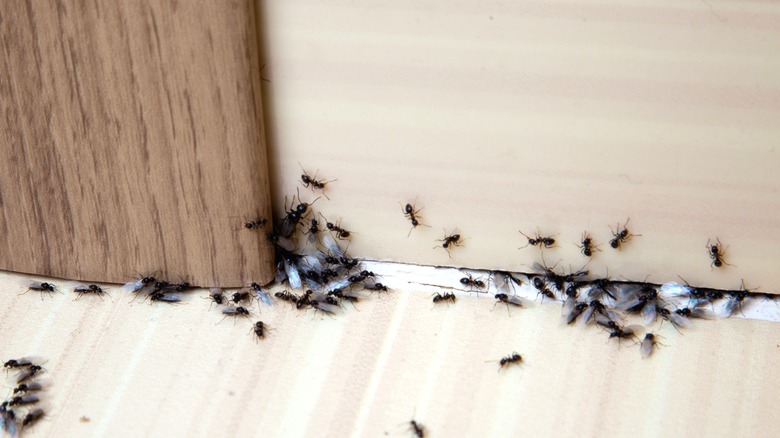The Easy Solution That Can Help Stop Ants From Invading Your Home
For DIYers needing safe and sensible materials for projects around the home, cedar is the gift that keeps on giving. The softwood is durable and attractive, with a natural rot resistance that makes it suitable for use indoors and outdoors. Perhaps more crucial than anything, though, are its pest prevention qualities. Eastern red cedar wood (Juniperus virginiana) is an efficient deterrent for nuisances like moths and cockroaches, while as a mulch, it can ward off ants. Its extract, meanwhile, puts those traits into hyperdrive. As an aromatic essential oil, cedarwood supplies not only various therapeutic benefits but also highly effective repellency against small household invaders.
Studies have shown cedarwood oil's repellent and toxic traits against ticks, termites, houseflies, and several types of ants. A 2014 study investigated cedarwood oil for managing invasive red fire ants and ants at hummingbird feeders. The oil was effective at stopping the ants from climbing to the sugar source, while concentrations as low as 1% were able to repel fire ants. A 2015 study had similar results, finding that cedarwood oil significantly reduced the presence of little fire ants on peanut butter-covered sticks. Of all the varieties, CO2-extracted oil maintains the highest amount of cedarwood's active component, cedrol, making it a top choice for DIY ant management around the house. If you're needing a natural way to get rid of ants, using cedarwood oil in a spray or on cotton balls will create an invisible yet powerful barrier against these common kitchen pests.
How to use cedarwood oil to keep ants away from the house
Since cedarwood oil makes an effective solution to disorient and push away ants, you only have to apply it strategically. Identify hotspots where ants have access to shelter, food, and water. Check for areas in the kitchen needing cleaning, leaky pipes needing fixing, and other common yet unexpected spots ants may be hiding in your home. Trace routes to find entry points. Once you locate them, you can apply a cedarwood oil treatment to effectively plug them.
An easy way to set up an essential oil solution is with cotton balls. Saturate a few cotton balls with about five drops of cedarwood oil. Place them around major ant traffic areas, refreshing them every few days as the scent wears away. You can also concoct a spray to use around frequented areas. Mix about 10 to 20 drops of cedarwood essential oil with a cup of water and a tablespoon of vinegar or alcohol (e.g., vodka) in a spray bottle. Spray it around traffic points like baseboards, windowsills, and countertops. Add more every few days to keep the repellency as strong as possible, and watch for results. When you discover the benefits of this uplifting natural scent, you'll be looking for even more ways to use cedarwood essential oil in your home.

